
INTERNATIONAL JOURNAL OF AUTOMOTIVE TECHNOLOGY
Scope & Guideline
Transforming Ideas into Automotive Solutions
Introduction
Aims and Scopes
- Automotive Powertrain Development:
Research on the design, optimization, and performance analysis of internal combustion engines, hybrid systems, and electric powertrains, focusing on efficiency, emissions, and fuel economy. - Intelligent Transportation Systems (ITS):
Studies related to the integration of advanced technologies in vehicles, including autonomous driving systems, vehicle-to-everything (V2X) communication, and traffic management systems. - Vehicle Dynamics and Control:
Investigations into the control systems for vehicle stability, handling, and safety, utilizing methods such as model predictive control and adaptive control strategies. - Materials and Structural Engineering:
Research on innovative materials and structural designs aimed at enhancing vehicle safety, lightweighting, and crashworthiness. - Energy Management and Environmental Impact:
Development of strategies for optimizing energy consumption in vehicles, including electric and hybrid vehicles, as well as studies on emissions reductions and environmental sustainability. - Battery Technology and Energy Storage Systems:
Exploration of advancements in battery technologies for electric vehicles, including battery management systems, energy density improvements, and thermal management. - Advanced Manufacturing Techniques:
Research on manufacturing processes and technologies related to automotive components and systems, focusing on quality, efficiency, and sustainability.
Trending and Emerging
- Autonomous Vehicle Technologies:
Research on the development and deployment of autonomous vehicles, including algorithms for perception, decision-making, and control, has surged, reflecting the industry's focus on self-driving technology. - Electric and Hybrid Vehicle Innovations:
There is a significant increase in research dedicated to electric and hybrid vehicle technologies, particularly in battery performance, energy management strategies, and charging infrastructure. - Artificial Intelligence and Machine Learning Applications:
The application of AI and machine learning in various aspects of automotive technology, from predictive maintenance to driver behavior analysis, is gaining traction, indicating a future-oriented approach. - Connected Vehicle Systems:
Research on vehicle connectivity, including V2X communication and its implications for traffic management and safety, is increasingly prominent as smart transportation systems evolve. - Sustainability and Green Technologies:
Emerging studies focus on sustainability practices within automotive engineering, including eco-friendly materials, lifecycle assessments, and renewable energy integration. - Advanced Safety Systems:
Innovations in advanced driver-assistance systems (ADAS) and their integration into vehicles are a growing area of research, emphasizing safety and accident prevention.
Declining or Waning
- Conventional Engine Optimization:
While traditional combustion engine optimization remains relevant, the increasing emphasis on electric and hybrid technologies has led to a decrease in studies focused solely on optimizing conventional engine designs. - Basic Vehicle Design Concepts:
Research focusing on foundational vehicle design principles has waned as the field evolves towards more complex and integrated systems involving automation and connectivity. - Traditional Materials Research:
There is a noticeable decline in studies centered around traditional materials, such as steel and aluminum, as the industry shifts towards advanced composites and lightweight materials. - Static Safety Analysis:
As the industry moves towards dynamic and real-world scenario evaluations, static safety analysis papers have become less prevalent, reflecting a shift towards more comprehensive safety assessments.
Similar Journals

Ingineria Automobilului
Accelerating Knowledge for a Sustainable FutureIngineria Automobilului is a prominent journal dedicated to advancing knowledge in the field of automotive engineering. Published by the SOC AUTOMOTIVE ENGINEERS ROMANIA, this journal serves as a vital platform for the dissemination of high-quality research, innovative methodologies, and groundbreaking applications in automotive technology. With an ISSN of 1842-4074, it provides an essential resource for researchers, professionals, and students who are committed to the development and enhancement of automotive systems. Although the journal currently does not offer open access, its contributions are crucial for ongoing advancements in automotive design, safety, and sustainability. The publication aims to foster collaboration between academia and industry, emphasizing the importance of interdisciplinary approaches in solving complex challenges facing the automotive sector today. By facilitating discussions on emerging technologies and engineering practices, Ingineria Automobilului continues to play a pivotal role in shaping the future of automotive engineering.
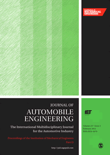
PROCEEDINGS OF THE INSTITUTION OF MECHANICAL ENGINEERS PART D-JOURNAL OF AUTOMOBILE ENGINEERING
Exploring Breakthroughs in Automobile Design and PerformancePROCEEDINGS OF THE INSTITUTION OF MECHANICAL ENGINEERS PART D-JOURNAL OF AUTOMOBILE ENGINEERING, published by SAGE PUBLICATIONS LTD, is a premier peer-reviewed journal dedicated to advancing the field of automobile engineering. Established in 1989, this journal serves as a vital platform for researchers, professionals, and students interested in the latest advancements in automotive technology and engineering practices. With a significant focus on aerodynamics, vehicle dynamics, and safety innovations, it consistently ranks in the Q2 quartile within both Aerospace Engineering and Mechanical Engineering, showcasing its influence and reliability in the academic community. The journal is indexed in Scopus with impressive rankings, being placed in the 41st percentile for Aerospace Engineering and the 214th percentile for Mechanical Engineering, further solidifying its importance in these fields. As an important resource for cutting-edge research, the journal does not currently offer open access, making it a great venue for disseminating substantial findings that drive the future of automotive innovation.
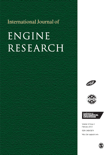
International Journal of Engine Research
Fueling Knowledge for Future Engineering InnovationsWelcome to the International Journal of Engine Research, an esteemed publication dedicated to advancing the fields of Aerospace Engineering, Automotive Engineering, Mechanical Engineering, and Ocean Engineering. Published by SAGE Publications Ltd and based in the United Kingdom, this journal has earned a prestigious reputation, consistently ranking in the Q1 quartile in several engineering categories as of 2023. The journal's impact is evident through its high Scopus rankings, positioning it within the top 25% of global research in Aerospace and Automotive engineering, and within the top 20% for Mechanical engineering. With a commitment to publishing rigorous, peer-reviewed research from 2000 to 2024, the International Journal of Engine Research plays a vital role in fostering innovation and collaboration within the engineering community. Although this journal does not offer open access, it remains a critical resource for researchers, industry professionals, and students striving to deepen their understanding in these dynamic fields.
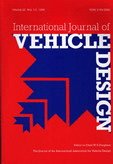
INTERNATIONAL JOURNAL OF VEHICLE DESIGN
Exploring the Future of Automotive EngineeringThe INTERNATIONAL JOURNAL OF VEHICLE DESIGN is a distinguished publication that has been at the forefront of automotive engineering and mechanical design since its inception in 1979. Published by INDERSCIENCE ENTERPRISES LTD in the United Kingdom, this journal aims to foster innovative research and technical knowledge in the field of vehicle design, encompassing various aspects from conceptualization to manufacturing and performance analysis. With an ISSN of 0143-3369 and an E-ISSN of 1741-5314, the journal extends its accessibility to a global audience, although it currently does not operate under an open access model. Recognized for its scholarly contributions, it holds a Q3 ranking in Automotive Engineering and a Q4 ranking in Mechanical Engineering as of 2023, reflecting its position among peers with an increasing impact in the discipline. Researchers, professionals, and students will find valuable insights and cutting-edge research in the articles published, contributing to a deeper understanding of advancing vehicle technologies and methodologies. For inquiries, the journal is based at the World Trade Center Building, 29 Route de Pré-Bois, Case Postale 856, CH-1215 Geneva, Switzerland, where one can also follow its developments and contribution to the growing body of knowledge in vehicle design.

International Journal of Heavy Vehicle Systems
Exploring the Future of Automotive EngineeringThe International Journal of Heavy Vehicle Systems, published by INDERSCIENCE ENTERPRISES LTD in the United Kingdom, is a pivotal resource for professionals and researchers in the fields of automotive and mechanical engineering. With an ISSN of 1744-232X and an E-ISSN of 1741-5152, this journal serves as an academic platform dedicated to exploring the latest innovations and technologies pertaining to heavy vehicle systems, including design, performance, and environmental impact. Boasting a Category Quartile of Q3 in both Automotive and Mechanical Engineering as of 2023, it ranks among the growing body of literature in these disciplines, indicative of its commitment to quality research. The journal is widely accessible through diverse open access options, encouraging the dissemination of knowledge within the academic community. By publishing cutting-edge studies and reviews, the International Journal of Heavy Vehicle Systems plays an essential role in advancing our understanding of heavy vehicle technologies, providing invaluable insight for engineers, researchers, and students eager to contribute to this dynamic field.

SAE International Journal of Vehicle Dynamics Stability and NVH
Transforming Knowledge into Automotive SolutionsSAE International Journal of Vehicle Dynamics Stability and NVH is a prestigious publication dedicated to advancing knowledge in the domains of automotive engineering, computational mechanics, control and optimization, and mechanical engineering. Published by SAE International, this journal boasts an impressive impact factor within its category, achieving a Q1 ranking in 2023 across multiple fields, including automotive engineering and computational mechanics. With ISSN 2380-2162 and E-ISSN 2380-2170, it serves as a crucial platform for the dissemination of innovative research and technological advancements in vehicle dynamics and noise, vibration, and harshness (NVH) analysis. Researchers, professionals, and students benefit from the journal's rigorous peer-review process and its commitment to high-quality publications. With a wide-reaching influence and an emphasis on interdisciplinary approaches, the journal is pivotal for those seeking to contribute to the evolution of vehicle technology and related areas.
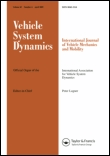
VEHICLE SYSTEM DYNAMICS
Pioneering insights into vehicle performance and safety.VEHICLE SYSTEM DYNAMICS, published by Taylor & Francis Ltd, is a premier journal dedicated to advancing the field of automotive and mechanical engineering. With an impressive impact factor and categorized in the top quartiles (Q1) of Automotive Engineering, Mechanical Engineering, and Safety, Risk, Reliability, and Quality, this journal has established itself as a vital resource for researchers, industry professionals, and academics alike. Spanning from 1972 to 2024, VEHICLE SYSTEM DYNAMICS focuses on disseminating high-quality, peer-reviewed research that addresses critical challenges and innovations in vehicle dynamics and system performances. The journal is based in the United Kingdom and continues to contribute significantly to the global discourse on safe and efficient vehicle design and operation. Readers can access the journal's content through various platforms, ensuring the latest research is readily available to inform and inspire future advancements in the field.
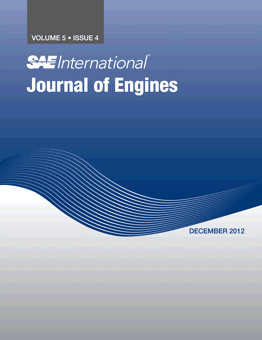
SAE International Journal of Engines
Exploring the Future of Engine TechnologiesSAE International Journal of Engines, published by SAE International, serves as a leading platform in the field of automotive engineering and fuel technology. Established in 2008, this journal has quickly gained recognition, achieving a Q2 ranking in Automotive Engineering and a Q3 ranking in Fuel Technology as of 2023. With the journal's ongoing commitment to advancing the understanding of engine technologies, it encompasses a diverse range of topics including engine performance, emissions, fuels, and innovative technologies driving the automotive industry. Researchers and professionals can benefit from the high-quality peer-reviewed articles that the journal features, while the comprehensive content serves as an invaluable resource for students engaged in automotive studies. Although it does not currently offer open access, the journal's credibility is further reinforced by its respectable Scopus rankings, indicating its significant impact within the academic community. For anyone seeking to stay at the forefront of engine research and automotive advancements, the SAE International Journal of Engines is an essential resource.
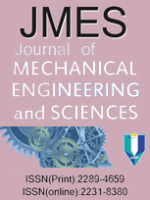
Journal of Mechanical Engineering and Sciences
Bridging Theory and Application in Engineering ExcellenceThe Journal of Mechanical Engineering and Sciences (ISSN: 2289-4659, E-ISSN: 2231-8380), published by UNIV MALAYSIA PAHANG, is a prominent open access journal established in 2011, dedicated to advancing the field of mechanical engineering and associated sciences. Covering a wide array of topics from industrial manufacturing processes to computational mechanics, the journal serves as a vital platform for researchers, professionals, and students to disseminate innovative findings and methodologies. With impressive Scopus rankings, including a place in the 60th percentile for Industrial and Manufacturing Engineering, the journal holds a significant position among its peers, facilitating global academic discourse. Located in Kuantan, Pahang, Malaysia, the journal emphasizes accessibility and collaboration within the engineering community, encouraging submissions that contribute to both theoretical and applied aspects of mechanical engineering.

Automotive Innovation
Transforming Ideas into Automotive AdvancementsAutomotive Innovation is a leading academic journal dedicated to the advancements and transformative trends in the field of automotive engineering. Published by SpringerNature, this esteemed journal boasts an impressive Q1 ranking in Automotive Engineering for 2023, reflecting its high impact and relevance with a rank of #17 out of 125 in the Scopus database, placing it in the 86th percentile. Focused on publishing cutting-edge research from 2018 to 2024, it serves as an essential platform for researchers, professionals, and students interested in exploring the latest innovations, technologies, and practices in automotive design, manufacturing, and sustainability. Though not an open access journal, its commitment to advancing knowledge in automotive engineering makes it an invaluable resource for anyone invested in the future of transportation. For further insights and research findings, the journal can be accessed at its editorial office located in the United States.